As Vietnam marks the 50th anniversary of national reunification, VietNamNet presents a special series titled “April 30 - A new era.” Experts, military leaders, and historical witnesses share reflections, lessons, and the indomitable will that led to independence and unity. Their stories aim to inspire faith in the nation’s continued development.
Fifty years after the end of the war, General Pham Xuan The - a Hero of the People's Armed Forces and former Commander of Military Zone 1 - vividly remembers standing face to face with South Vietnamese President Duong Van Minh at the Independence Palace on April 30, 1975.
“You have been taken prisoner. You must declare unconditional surrender. There will be no handover,” he told Minh. It was a pivotal moment that sealed Vietnam’s victory in the Ho Chi Minh Campaign.

General Pham Xuan The recalls the end of the war at the Independence Palace. Photo: Nguyen Hue
The memory remains as vivid as ever for Pham Xuan The, then a 28-year-old captain and deputy commander of Regiment 66 (Dong Son Unit) under Division 304, 2nd Army Corps.
He was among the first to storm the Independence Palace and witness the final collapse of the Saigon regime.
He recalls the mix of emotions: excitement, pride, and deep sorrow for fallen comrades. He had already fought in six major campaigns in the South before the decisive push into Saigon.
The final push to the Independence Palace
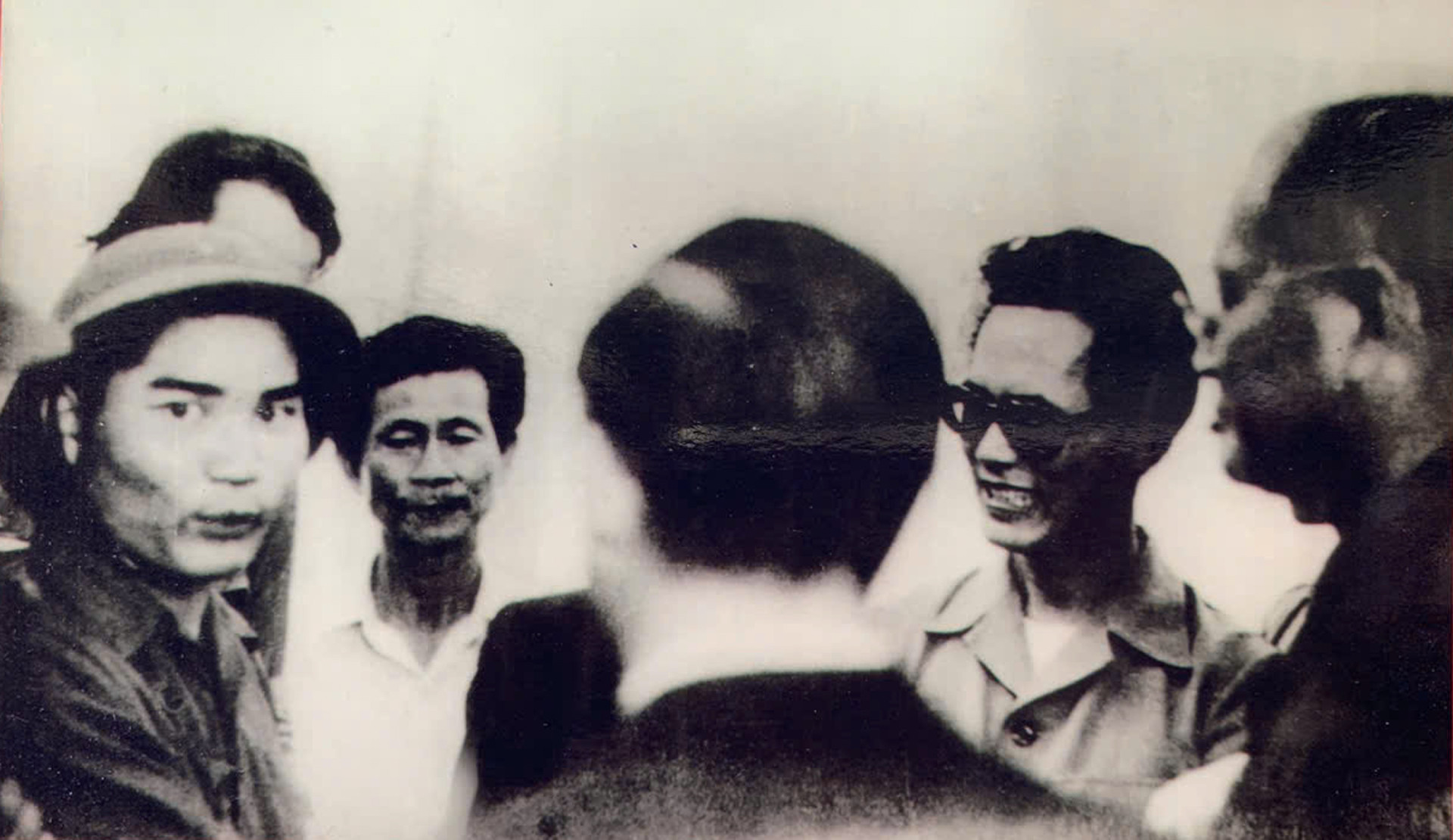
Regimental Deputy Commander Pham Xuan The (far left) meets President Duong Van Minh (far right) in the Independence Palace meeting room. Archival photo: Provided by subject
Assigned to lead Battalion 7, the spearhead unit alongside tanks of the deep strike force, Captain The’s regiment advanced into Saigon. On the morning of April 30, they captured Saigon Bridge and then fought for 15-20 minutes at Thi Nghe Bridge, destroying three armored vehicles. Guided by a local resident, they headed down what is now Le Duan Street toward the palace.
As they neared the gates, the first tank rammed the left side of the entrance, halted, and a soldier jumped out with a liberation flag. The second tank broke through the gate and veered left. The jeep carrying Captain The and his team followed, stopping to the side of the palace.
Inside, the atmosphere was surreal. Cameras clicked and whirred. As he reached the staircase landing, The encountered Brigadier General Nguyen Huu Hanh, aide to Duong Van Minh. Hanh invited the liberation army to meet with the cabinet inside the conference room.
In the meeting room, General Hanh introduced Duong Van Minh and Prime Minister Vu Van Mau. Minh said, “We know the liberation army is entering the city. We’re awaiting you to arrange the transfer of power.”
The responded immediately: “You are prisoners. You must declare unconditional surrender. There will be no transfer.”
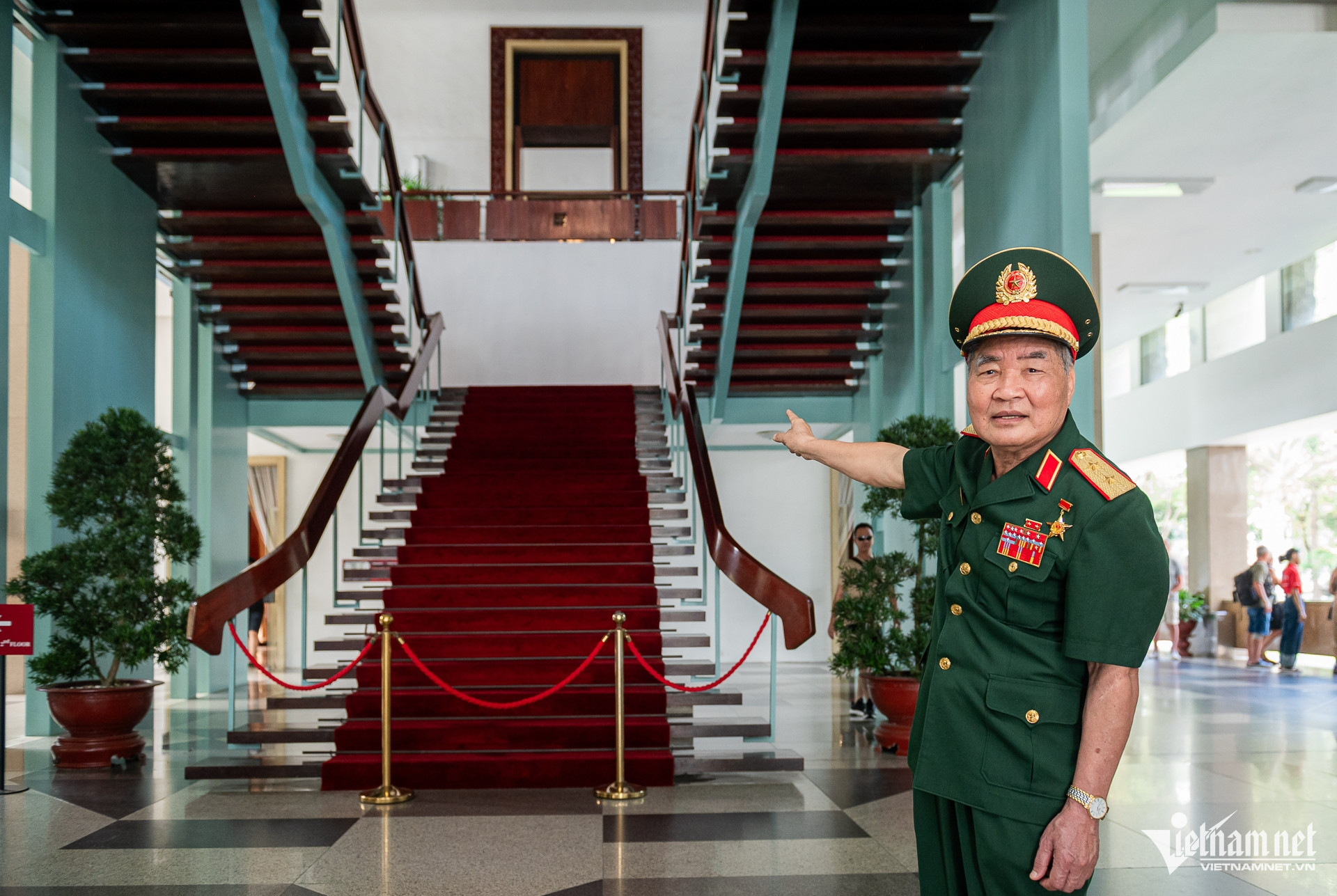
General Pham Xuan The indicates where he met Nguyen Huu Hanh at the Independence Palace. Photo: Nguyen Hue
Minh objected to traveling to the radio station, citing safety concerns. Captain The assured him: “We’ve taken control of the city. Your safety will be guaranteed.” They exited the building together. When Minh offered his own vehicle, The gestured to his jeep: “We have our own transport.”
Broadcasting surrender to the nation
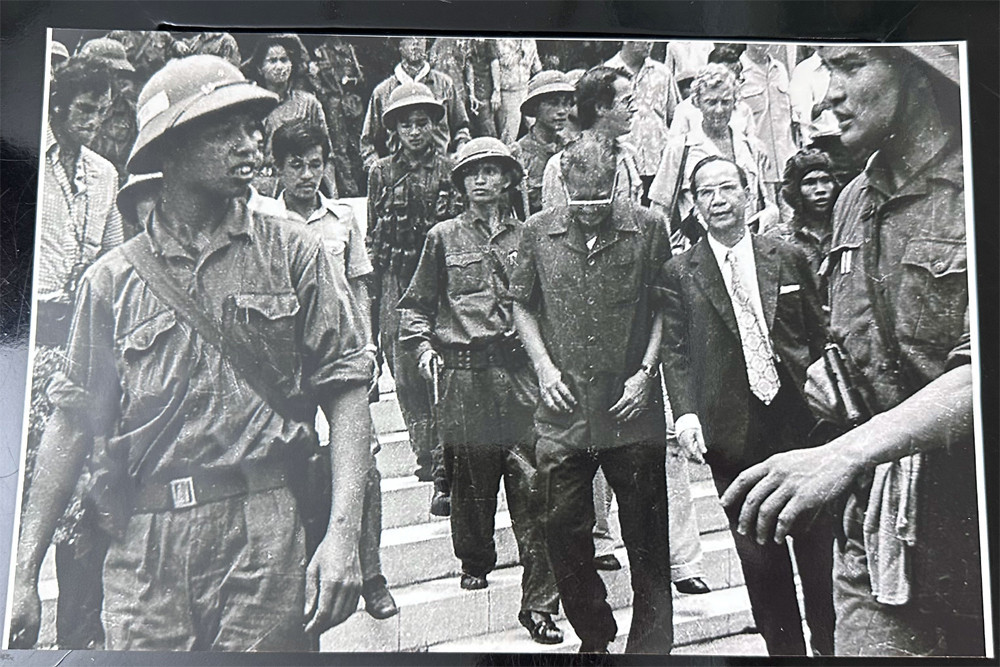
Captain Pham Xuan The (front row, far right) leads President Duong Van Minh and Prime Minister Vu Van Mau from the Independence Palace to the radio station. Archival photo at Ho Chi Minh Campaign Museum (Military Zone 7)
As the convoy moved through crowds and advancing troops, Captain The asked Minh about the strength of the liberation forces. Minh admitted: “Once you entered the city, we knew it was over.” Pressed on why he didn’t surrender earlier, Minh confessed: “If I had declared surrender too soon, others beneath me would have killed me.”
At the Saigon radio station, they began drafting the surrender announcement. The played a lead role in composing the message, assisted by officers from various units. When technical issues delayed the recording, German journalist Börries Gallasch stepped in with professional equipment to capture the message.
Once the surrender was recorded, journalist Ky Nhan of AP helped locate the station staff to operate the broadcast. Around 1:30 p.m., President Duong Van Minh’s surrender was aired, followed by a live broadcast of liberation army representative Bui Van Tung accepting the declaration.
Minh declared: “I, General Duong Van Minh, President of the Saigon government, call upon the armed forces of the Republic of Vietnam to lay down their weapons and unconditionally surrender to the Liberation Army of South Vietnam. The Saigon government from central to local levels must dissolve and hand over all power to the Provisional Revolutionary Government of the Republic of South Vietnam.” (Source: History of the Ho Chi Minh City Party Committee, 1930-1975, p. 912, National Political Publishing House, 2015)
Acting without orders, fulfilling the mission
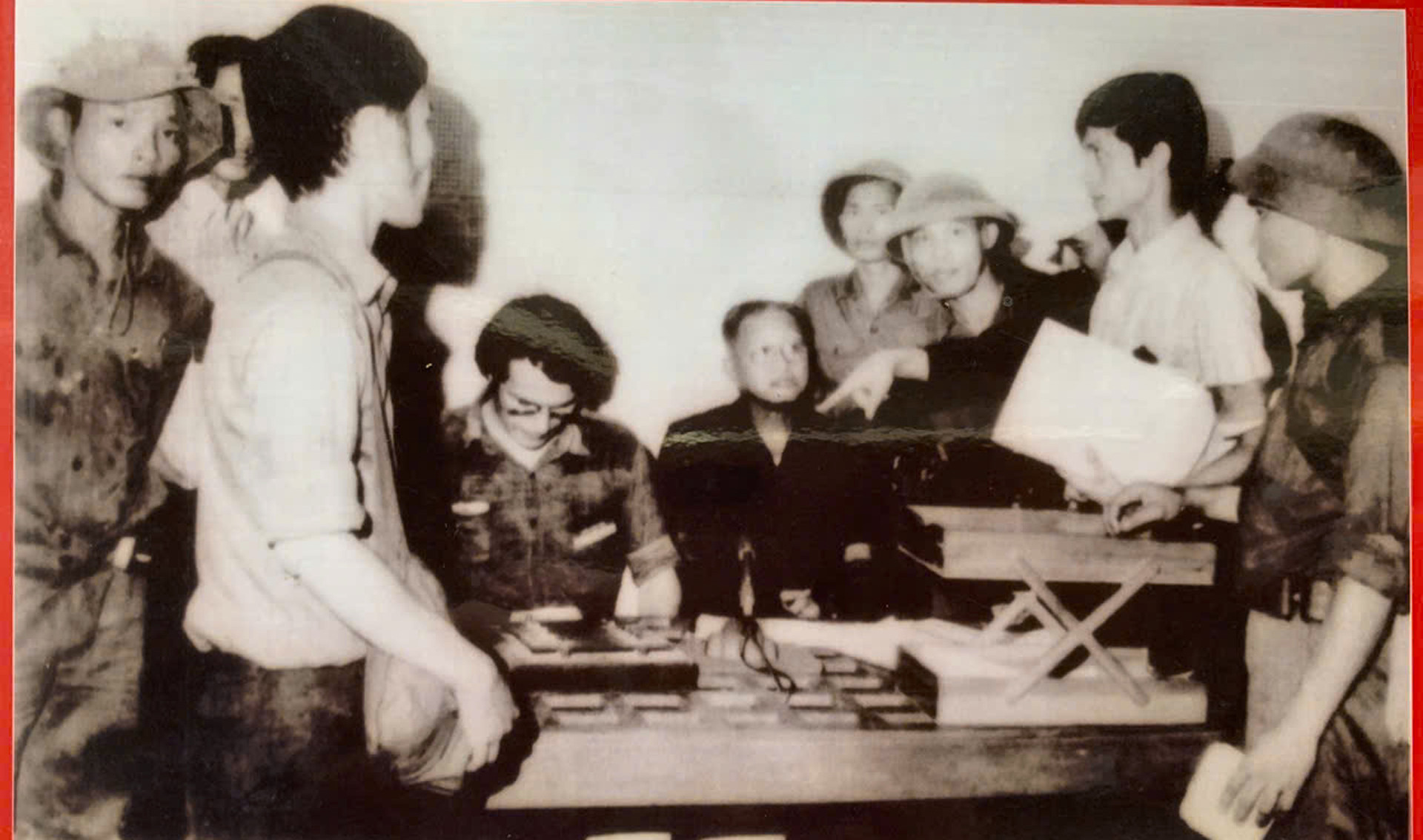
Pham Xuan The (far right) holds the draft document as he and comrades demand Duong Van Minh's unconditional surrender. Archival photo: Provided by subject
At the time, The had no means to contact superiors. “We had to act fast to end the war,” he said. When he returned to the palace later that afternoon, Deputy Political Commissar Nguyen Cong Trang scolded him: “Who gave you permission to act that way?” It wasn’t until Major General Nguyen An commended their swift action that he felt relief.
Though overjoyed at victory, The couldn’t help but feel sorrow for comrades lost in battle - even those who died hours before the final moment. “They gave their lives so we could press into the enemy’s final stronghold and unify the country,” he said.
Born in 1947 in Kha Phong, Kim Bang, Ha Nam, Pham Xuan The joined the army at age 20. He fought in Khe Sanh, then in campaigns across Central Vietnam before joining the final Ho Chi Minh Campaign. He can no longer recall how many battles he fought or wounds he sustained.
In March 2025, veterans of the 2nd Army Corps revisited former battlefields, beginning in Hanoi and reaching Quang Tri. The 2nd Corps was the first regular army corps established in the South, founded May 17, 1974, in Ba Nang hamlet, Ba Long commune, Dakrong district, Quang Tri.
During this commemorative journey, General The revisited places of both triumph and tragedy. His voice quavered as he recalled the brutal fight at Hill 1062, where comrades died crying out for their mothers or in silent sacrifice.
The turning point at Thuong Duc
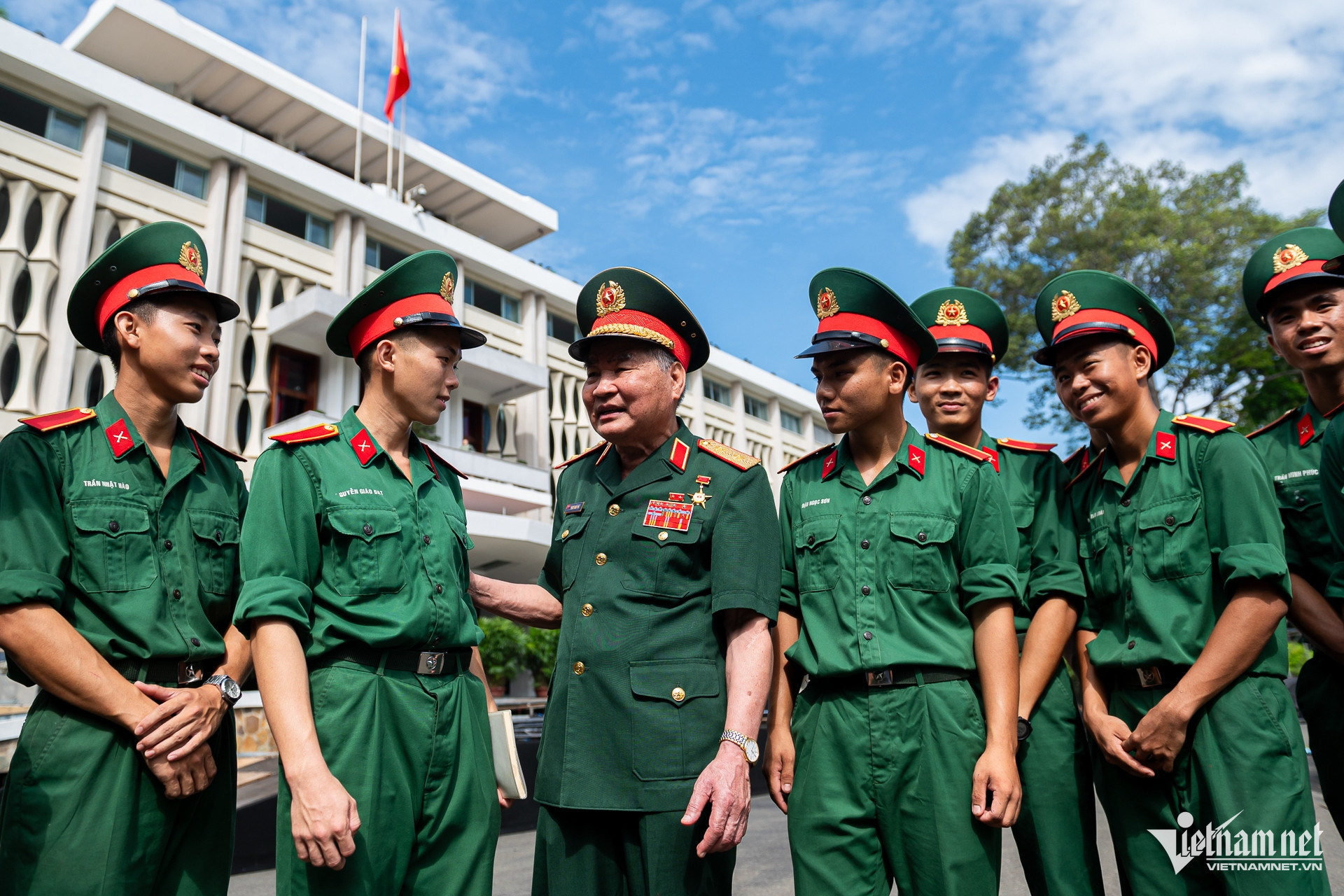
At the Independence Palace in early April, General Pham Xuan The meets students from the 2nd Army Officer School. Photo: Nguyen Hue
The Battle of Thuong Duc in present-day Dai Loc district, Quang Nam, marked a decisive moment. The area was seen by the enemy as a “steel gate” to Da Nang. The 304th and 324th Divisions, supported by other units, fought ten days to liberate Thuong Duc on August 7, 1974. However, combat around Hill 1062 dragged on for four more months. In all, 921 Vietnamese soldiers died in this campaign.
Thuong Duc’s liberation paved the way for coordinated offensives that freed Quang Nam on March 24, 1975, and Da Nang five days later.
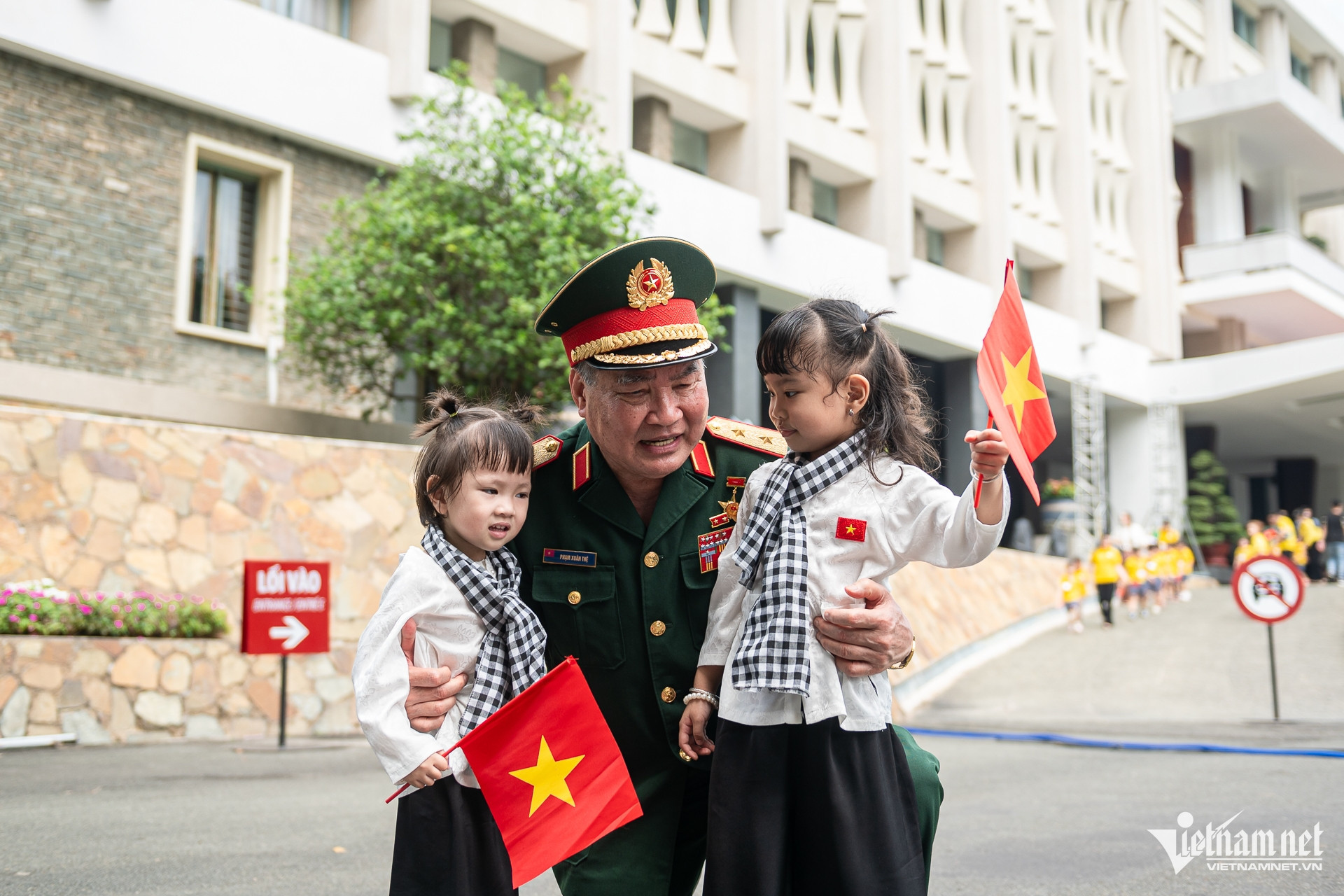
In 2014, veterans helped erect a memorial monument at Thuong Duc to honor the fallen. The site, now a nationally recognized historical relic, serves as a powerful reminder to younger generations.
Now nearly 80 years old, General The reflects with pride on Vietnam’s development. “From the past to the present, Ho Chi Minh City has changed so much. We hope the younger generation treasures this legacy and works hard to build a better future.”
Pham Xuan The, former Commander of the 304th Division, 2nd Army Corps Commander, and Commander of Military Zone 1, retired in December 2007 after 42 years of service. He received numerous decorations and, in April 2011, was named a Hero of the People’s Armed Forces for his wartime service.
Bao Anh - Nguyen Hue - Phuoc Sang